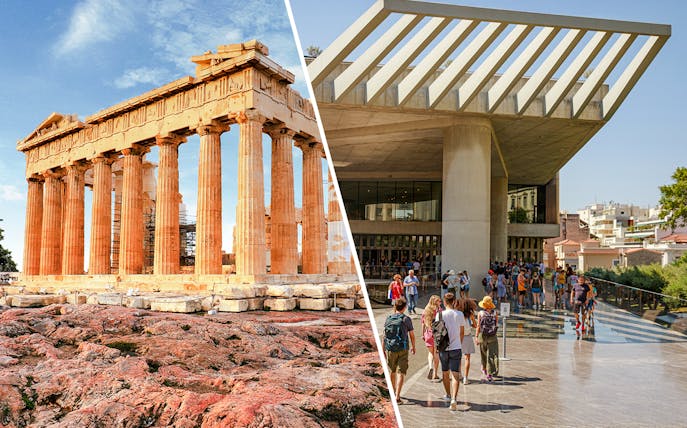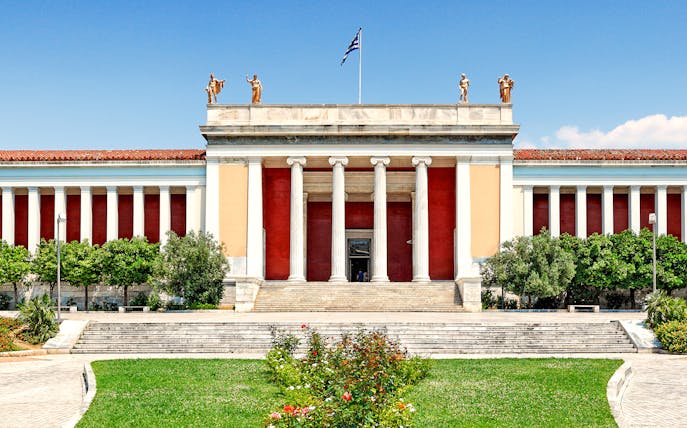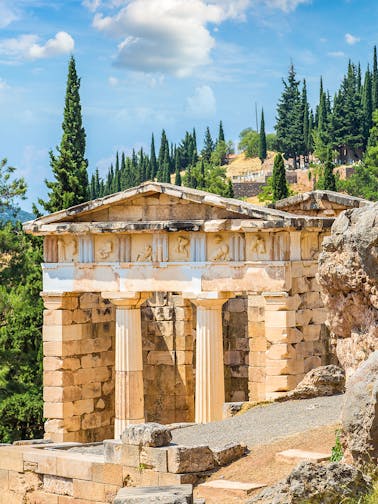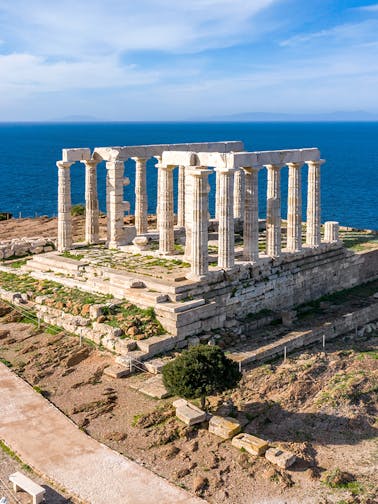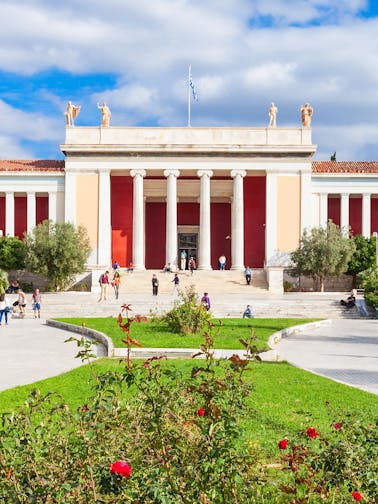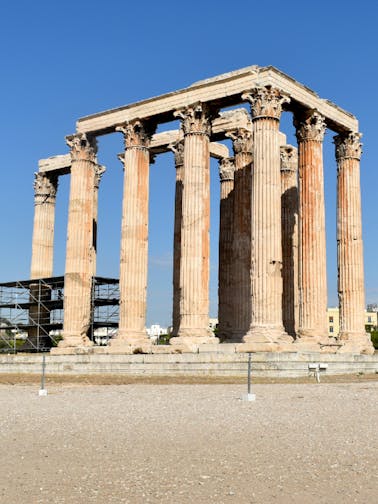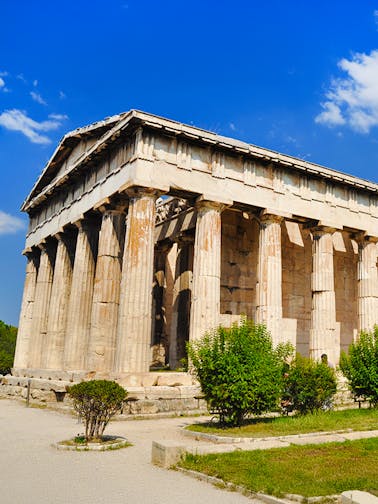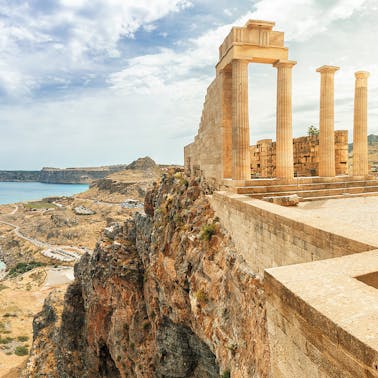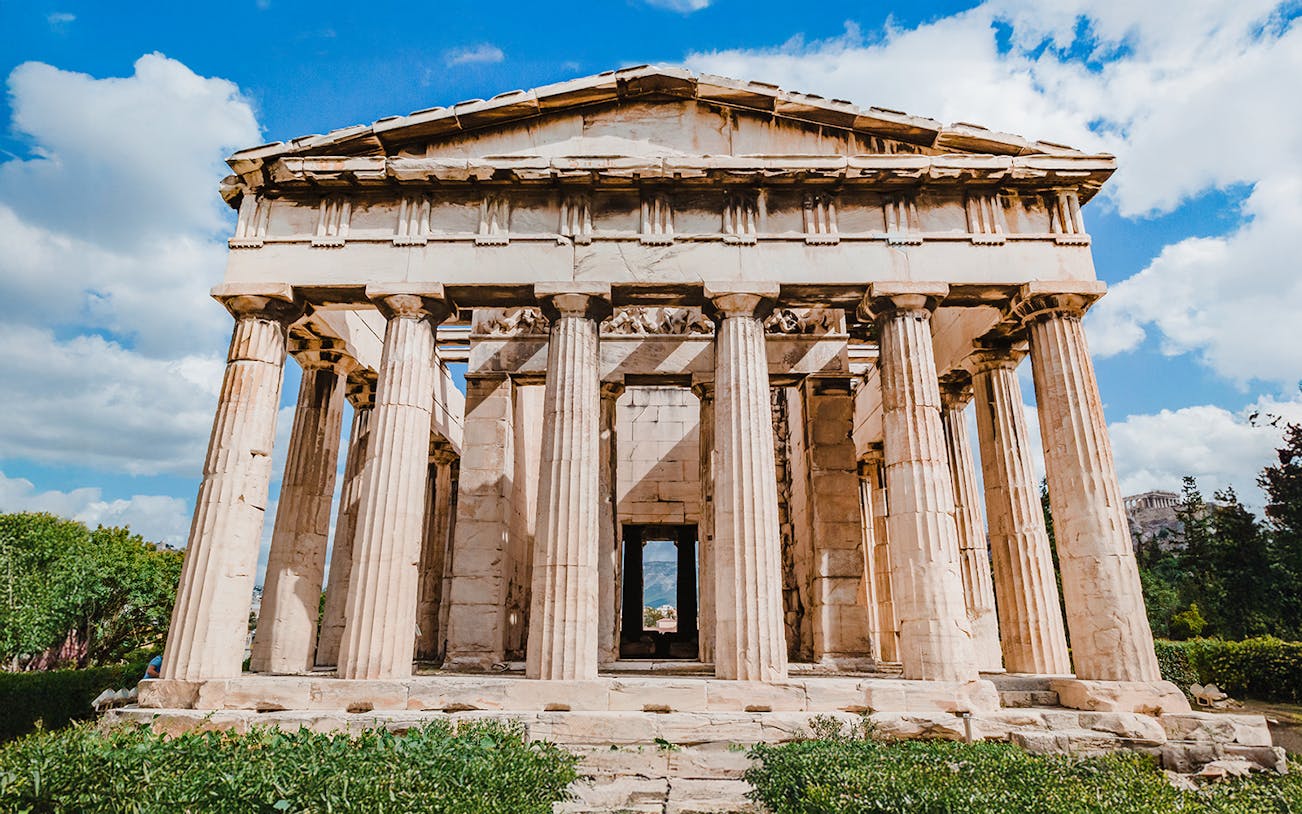
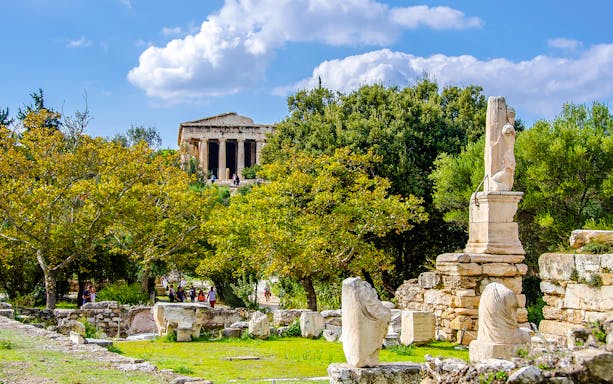
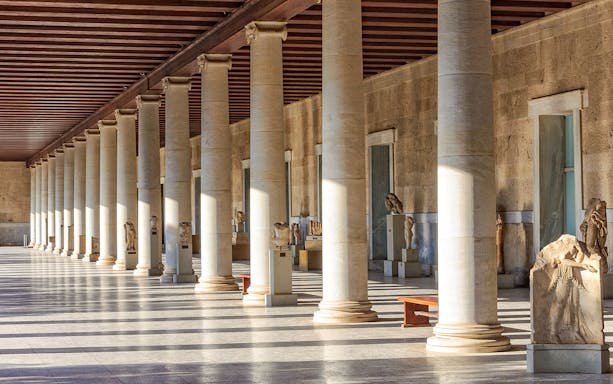
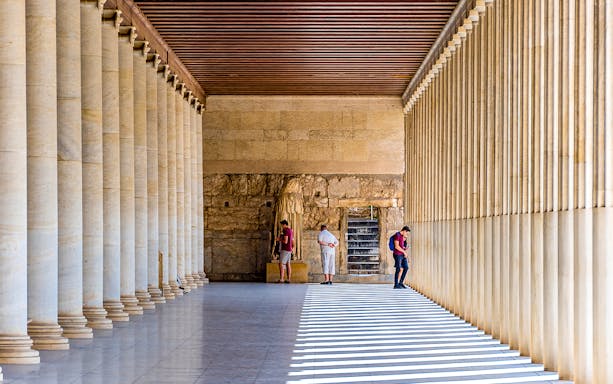

Explore at your pace
Audio guide
-
Walk through the Ancient Agora, a bustling civic and commercial hub of classical Athens, where politics, trade, and philosophy shaped the city’s identity.
-
Visit the Temple of Hephaestus, one of the best-preserved ancient Greek temples, dedicated to the god of fire and craftsmanship.
-
Step inside the reconstructed Stoa of Attalos, now home to the Museum of the Ancient Agora, and see artifacts ranging from ostraka used for exile votes to tools of everyday life.
-
With the optional audio guide, hear stories of Socrates debating beneath shaded colonnades, Pericles inspiring citizens, and Athenians casting votes that gave birth to democracy.
-
Did you know? The Agora once hosted theatrical performances and athletic contests, making it not only the political heart of Athens but also a place of entertainment and community.
-
-
Entry to the Ancient Agora archaeological site
-
1.5–2 hour self-guided audio tour of Ancient Agora (as per option selected)
-
Audio guide available in English, Italian, Greek, German, Spanish, and French (if option selected)
-
Access to the Temple of Hephaestus
-
Access to the Museum of the Ancient Agora in the Stoa of Attalos
-
Audio guide access on an Android or iOS smartphone with an offline interactive map (if option selected)
-
-
Hotel pick-up and drop-off
-
Transfers
-
Live guide
-
Headphones
-
Food and beverages
-
Personal expenses
-
These tickets can't be cancelled or rescheduled.
- 1,573 reviews4.1
How do we collect reviews?
These ratings include verified reviews from both Headout guests and our trusted partners who operate this experience locally. All reviews come from real travelers who've taken this experience.
1K19246104210What our guests say
Roy
Sep 2025Verified booking4/5Fotis
Jan 2025Verified booking5/5Lucas
Mar 2024Verified booking5/5Gianenrico
Dec 2023Verified booking5/5Cristiano
Dec 2023Verified booking5/5
Journey through the Ancient Agora, the birthplace of democracy, where temples and stoas echo the debates and decisions that shaped Western history. With an optional multilingual audio guide, uncover the stories of philosophers, statesmen, and everyday Athenians as you walk the same paths where Socrates, Pericles, and Aristides once stood.
Getting started
Meet your host just outside the entrance to the archaeological site, located near the Monastiraki metro station, a vibrant hub that makes it easy to spot. After a quick ticket validation, you’ll receive orientation on using your audio guide (if selected), complete with offline access and an interactive map to navigate the site at your own pace. From here, you’re free to explore one of Athens’ most iconic landmarks with history in your pocket.
The Temple of Hephaestus and civic life
Begin your journey at the Temple of Hephaestus, the best-preserved Doric temple in Greece. Nestled on a hill overlooking the Agora, its elegant columns and friezes honor the god of craftsmanship, a fitting tribute in a city celebrated for innovation. Just below lies the Bouleuterion, the council house where 500 citizens met daily to draft laws. Imagine the lively debates that prepared motions for the Assembly, a cornerstone of the world’s first democracy.
Stoa of Attalos and the Agora Museum
Stroll into the grand Stoa of Attalos, a reconstructed colonnade that today houses the Museum of the Ancient Agora. Inside, artifacts reveal both the ingenuity and strictness of Athenian society, from ostraka (shards used in exile votes) to jury selection machines that ensured fairness in trials. Your audio guide breathes life into these relics, explaining how justice was practiced in ways both radical and ruthless, while anecdotes about figures like Aristides the Just showcase democracy’s very human dimension.
Philosophers and Orators on the Pnyx
Climb the hill of the Pnyx, a rocky platform with sweeping views of the Acropolis. This was the stage of democracy itself, where citizens gathered to vote, cheer, or jeer as leaders like Pericles addressed the crowd. With audio commentary, you can picture the assembly of thousands debating war, peace, and policy, while the panoramic view gives you the same perspective Athenians once had as they shaped history. Nearby, the Rock of Ares (Areopagus) adds another chapter, renowned as the site where Ares himself was tried by the gods.
Socrates, stories, and lasting legacies
As your path winds toward Philopappos Hill, you’ll come across the Prison of Socrates, said to be where the philosopher spent his final days before drinking hemlock. Whether fact or myth, it sparks reflection on how Athens both nurtured and silenced its thinkers. Along the way, your guide shares stories of Solon’s legal reforms and the cultural flowering under Pericles, making the Agora a living classroom of human ambition and ideals.
From Assembly to Theater
Your tour concludes near the Theatre of Dionysus, just outside the Agora and at the foot of the Acropolis. Here, the tragedies of Aeschylus, Sophocles, and Euripides were performed for the first time, shaping theatre as we know it today. It’s a fitting finale, tying together politics, philosophy, and performance in the city that gave the world democracy, drama, and enduring ideas.
What to bring
-
Wear comfortable, sturdy shoes, as the ground can be uneven, dusty, and slippery during the dry months.
-
Carry a reusable water bottle; there’s a refill station by the Stoa of Attalos, especially handy in summer.
-
Pack essentials like a hat, sunscreen, and extra water since shaded areas around the ruins are limited.
-
Keep your phone fully charged so it lasts for the audio guide.
-
Bring your own headphones for a smooth listening experience.
What’s not allowed
-
Flash photography and tripods are prohibited inside. Professional filming or photography requires prior approval from the Ministry, and staff may intervene if you attempt to set up equipment without a permit.
-
Flying drones is forbidden without official authorization, so please don’t attempt to use one here.
-
Pets are not permitted on-site, though certified service animals are welcome.
-
Do not touch or remove stones, pottery shards, or any remains—these are protected under Greek law.
Accessibility
-
A wheelchair-accessible entrance is available at Apostolou Pavlou, near the Temple of Hephaestus, though inside the site, much of the terrain is uneven with gravel, slopes, and steps, making full access limited.
-
If entering from Adrianou 24, consider having a companion assist with navigating the rough ground. Site staff can also be contacted at +30 210 3214824 or +30 210 3210180.
-
The Stoa of Attalos Museum is fully accessible, with adapted restrooms.
-
At the information desk, tactile maps and brochures in Braille (Greek and English) are provided.
Additional information
-
Due to ongoing construction works, the main entrance of the Ancient Agora is temporarily closed. Please use the temporary entrance on Apostolou Pavlou Street, near Akamantos Street.
-
Entry is only permitted within your reserved time slot (15 minutes before until 15 minutes after).
-
Arrive about 30 minutes early to allow for security checks; the last entry is 20 minutes before closing.
-
Your e-ticket and audio guide instructions will be sent in a separate email—check your spam folder. Download both to your device for offline use or print the ticket for entry.
-
The audio guide is not compatible with Windows Phones, iPhone 5/5C or earlier, iPod Touch 5th gen or earlier, iPad 4th gen or earlier, or the first iPad Mini.
-
Opening hours vary seasonally from 8am to 8pm (April to June) and gradually shorten to 8am to 5:30pm (late October), with last entry always 20 minutes before closing.
-
If you arrive between 8am and 9am, head straight up to the Temple of Hephaestus while it is still quiet, then follow the Panathenaic Way back down to the Stoa of Attalos Museum later in the day, when the shade makes it more comfortable.
Concession eligibility
-
EU citizens under 25, including students, enjoy free admission year-round with a valid ID or passport, but must queue at the ticket office to collect a zero-value pass.
-
Non-EU citizens under 25 are entitled to discounted rates during the peak season (April to October) with a valid ID, and must also queue at the ticket office.
-
Children under 5 years old enter free of charge.
-
EU citizens over 65 qualify for discounted rates.
-
Non-EU citizens over 65 qualify for discounted rates during the peak season (April to October).
-
Persons with disabilities (67% or more) and one accompanying person are granted free admission with a Disability Card, ID, or passport.
-
-
Your voucher will be emailed to you instantly.
-
Display the voucher on your mobile phone with a valid photo ID at the redemption point.
-
Please arrive at the redemption point 30 mins before the scheduled time of your visit to avoid any delays.
Ticket redemption point
-
Show your ticket at Ancient Agora of Athens.
-
Address: Athens 105 55, Greece.
-
Landmark: Near the Temple of Hephaestus.
-
Similar experiences you'd love
Top things to do in Athens
Nearby cities to explore




